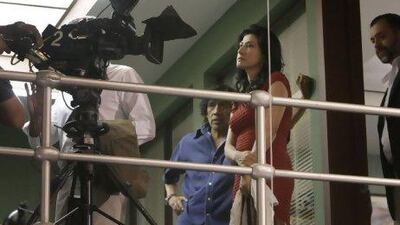While Americans prepare to mark the 10th anniversary of the events of September 11, 2001, millions of Mexicans have been glued to a soap opera that examines the aftermath on both sides of the US border.
The popular soap opera The Eighth Commandment, which has unfolded over the summer, began with the central character at a meeting at one of the World Trade Centre towers on September 11. Thousands of kilometres away, her family watches as the planes crash into the towers and they eventually fall. A decade later, the character, Isabel Sanmillan, finds herself back in Mexico, thanks to the efforts of her daughter Camila in finding her. But she doesn't remember who she once was, a photographer and the founder of a newspaper. Her employees have a hard time, as well, believing that this woman, who has unexpectedly returned, owns their company.
The six-month-long series, which has not aired in the US, has taken on the subject with more candour than most US productions have dared to adopt so far, featuring scenes set inside the towers during the attacks and portraits of individuals who perished.
Producer Epigmenio Ibarra said he aimed to tell intimate stories within the epic frame while dealing with other themes in the news, such as Mexican government corruption, violence against journalists and the country's out-of-control drug violence.
"It was a landmark that was not only powerfully symbolic, but so big, so extremely terrible that it let us insert a story of human drama that was truthful... that gave us a theme we wanted to talk about: the perspective of the victims," Ibarra said.
He said his idea gained extra inspiration after the May killing of Al Qaeda leader Osama bin Laden. One of the first scenes in the series, in fact, shows the Sanmillan family's response to the terrorist leader's death.
Actress Sara Maldonado, who broke from her usual good-girl roles to play daughter Camila, said the spectre of the event haunted the set even a decade later.
"It's already the 10th anniversary, but it's super-present," Maldonado said during a break in shooting at a studio in Mexico City. "Each time we did scenes about the subject, I got goose bumps."
That provocative mix of elements fits Ibarra's reputation for having pushed the popular telenovela form during his 15-year-long career. Ibarra also draws from his journalism background and still writes a news column in the Mexican daily newspaper Milenio. Through his production company, Argos Communications, in 1996, Ibarra produced Nothing Personal, which was the first Mexican telenovela set in the world of politics and drug trafficking.
Later, he cast a woman as an antihero in the soap opera The Gaze of a Woman, adding a novel grittiness to the otherwise rosy genre. Ibarra went on to win three International Emmy nominations with the HBO Latin American production Capadocia, which takes places in a corrupt women's prison.
He knew he was breaking new ground by taking on the September 11 attacks, which Hollywood has so far approached cautiously. Right after the event, images of the imposing skyscrapers were even scrubbed from already filmed scenes in several movies.
"There's a resistance in American television that I think it's time to break," Ibarra said. "Ten years let us bring up the subject."
Ibarra certainly does not hold back on the show. In one of the first episodes, Isabel Sanmillan's son is bullied by a schoolmate who says his mother died from an "overdose of concrete". The show also recreates terrifying moments inside the towers' stairwells during the buildings' collapse.
Sanmillan herself is rescued on the tower stairs by an undocumented Mexican immigrant. Later, she calls her husband with her face still bloodied.
"We are dealing with it without self-censorship," said Leticia Huijara, who plays Isabel and a past winner of Mexico's equivalent of an Academy Award. "For [Americans], it continues being a subject, in some ways, taboo."

